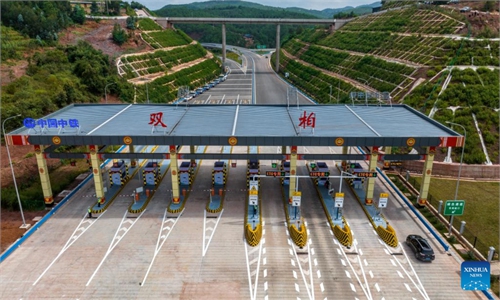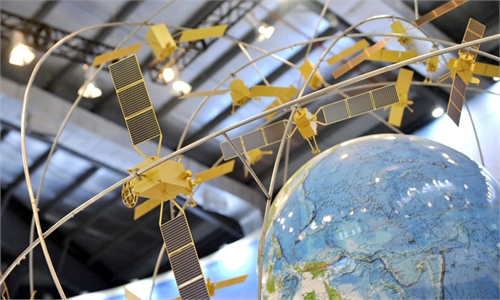
A volunteer is seen at the first International Summit on BeiDou Navigation Satellite System (BDS) Applications, in Changsha, central China's Hunan Province, Sept. 16, 2021. The First International Summit on BDS Applications opened Thursday with the theme "BDS serves the world, application fuels the future." Photo:Xinhua
The total output value of China's satellite navigation and location-based service industry exceeded 470 billion yuan ($64 billion) in 2021, with a compound annual growth rate of over 20 percent, said a white paper released by the State Council Information Office on Friday, highlighting a fast growing BeiDou Navigation Satellite System (BDS) applications industry in China.BDS is a project built and operated by China as a component of the country's national security and economic and social development strategy. After many years in development, it has become an important new element of China's infrastructure, providing high-accuracy, round-the-clock positioning, navigation and timing services to global users in all weathers.
In terms of product manufacturing, breakthroughs have been made in a series of key BDS technologies such as chips and modules, which has effectively driven up the shipment volume. By the end of 2021, there were more than 1 billion terminals using the BDS positioning function nationwide, the report said.
Through applications such as smartphones, vehicle terminals and wearable devices, BDS is being widely applied in daily life, the sharing economy and areas that are important to public wellbeing.
As of the end of 2021, BDS had been installed in more than 7.8 million road transport vehicles nationwide. Approximately 8,000 BDS terminals were in use on the country's railway network, and more than 100,000 agricultural machines were equipped with self-driving systems based on BDS.
BDS-based services in health care, epidemic prevention, remote monitoring and online services sectors were worth almost 200 billion yuan.
BDS-based applications have also shown their growing relevance in scenarios closely related to daily life, notably in smartphones and smart wearable devices.
BDS has been widely supported by products from international mainstream chip manufacturers, including smartphone device suppliers. In 2021, 324 million Chinese smartphones supporting BDS services were shipped, accounting for 94.5 percent of the country's total, the report said.
BDS satellite navigation system bolsters Chinese online map app's positioning capability.
The daily positioning volume of BDS during the National Day holidays exceeded 150 billion times, an increase of more than 50 percent compared with the pre-holiday period, China's tech giant Baidu said in October.
The data came after Chinese online map Baidu Maps announced an official switch to the Beidou priority positioning on September 30, with daily positioning volume exceeding 100 billion times for the first time. The company said 97.81 percent of positioning had achieved BDS priority.
Global Times


